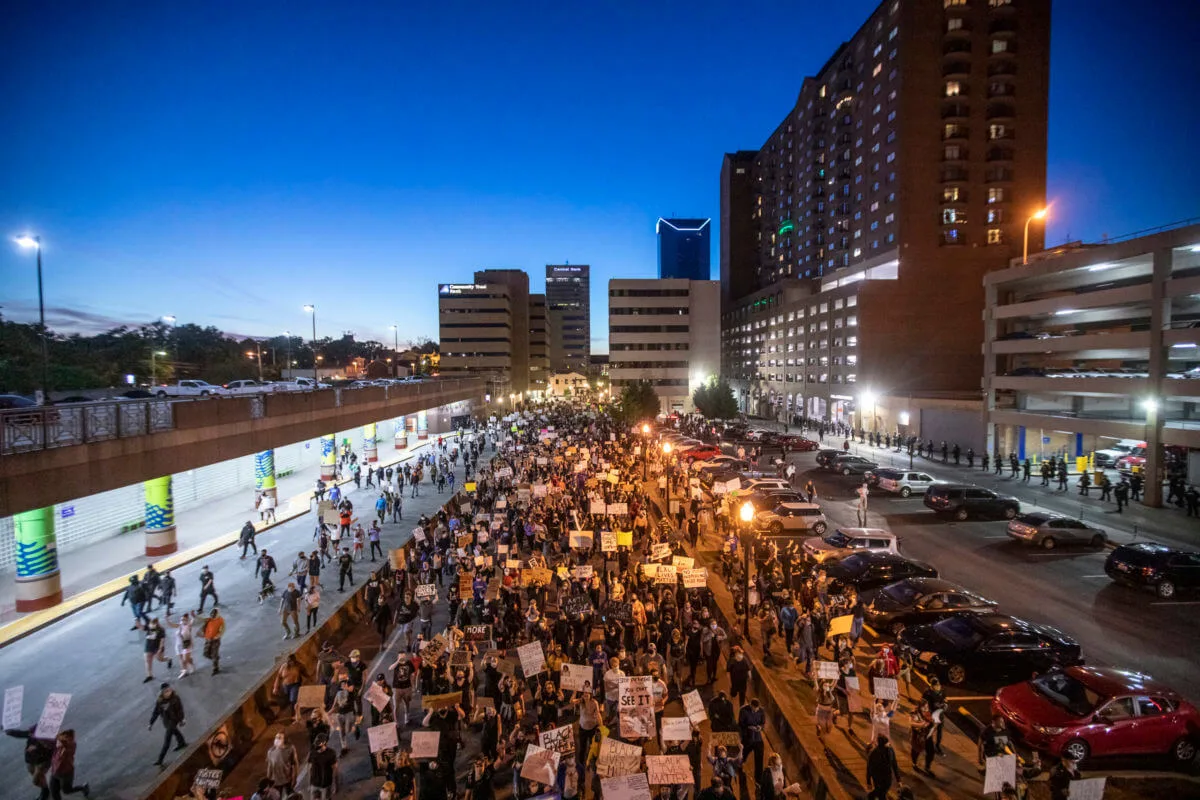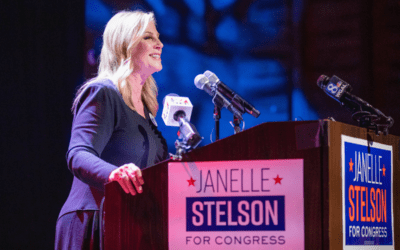
Protesters walk down East Vine Street in Lexington, Ky., during a rally against the deaths of George Floyd and Breonna Taylor on Sunday, May 31, 2020. (Ryan C. Hermens/Lexington Herald-Leader via AP)
In its request for extraordinary powers, the DEA cites the “violence and looting” of the widespread national protests.
According to a memo leaked to Buzzfeed News, the Drug Enforcement Administration has been granted temporary but widespread powers to conduct surveillance and collect intelligence on citizens exercising their constitutional right to protest the killing of George Floyd.
In its request for extraordinary powers, the DEA cites the “violence and looting” of the widespread national protests. “Police agencies in certain areas of the country have struggled to maintain and/or restore order,” the memo reads.
On Sunday, a senior Justice Department official approved the ask for 14 days, effective immediately, Buzzfeed reports. A spokesperson for the DEA did not return a request for comment by the publication.
Attorney General William Barr, who has been tapped by Trump to handle the national response to protests, issued a statement on Saturday evening after, at times, police clashed violently with demonstrators. Barr blamed “anarchistic and far left extremists, using Antifa-like tactics” for the confrontations, and promised the Federal Bureau of Investigations, DEA, US Marshals, and the Bureau of Alcohol, Tobacco, Firearms and Explosives would be “deployed to support local efforts to enforce federal law.”
RELATED: How Trump Is Using the Protests — and the Language of War — to Campaign for Re-Election
Barr was not explicit about what those agencies would do, and although DEA involvement has traditionally been relegated to situations involving federal drug crimes, Associate Deputy Attorney General Bradley Weinsheimer granted approval to expand the agency’s mandate “to perform other law enforcement duties” that Barr may “deem appropriate.”
This includes “covert surveillance,” sharing intelligence with local and state law enforcement, to “intervene” to “protect both participants and spectators in the protests,” to conduct interviews and searches, and to arrest protesters special agents allege have broken federal law.
“Drug enforcement agents should not be conducting covert surveillance of protests and First Amendment protected speech,” Hugh Handeyside, a senior attorney for the ACLU, told Buzzfeed. “That kind of monitoring and information sharing may well constitute unwarranted investigation of people exercising their constitutional rights to seek justice. The executive branch continues to run headlong in the wrong direction.”
For decades, federal agencies have infiltrated protest and activist groups, from the CIA’s recruitment of plants to destroy the Black Panther Party during the 1970s to the Department of Homeland Security monitoring the social media of protesters in Baltimore over the death of Freddie Gray in 2015. Undercover police have already been suspected of inciting violence while disguised as demonstrators during the Floyd protests.
It’s unknown if the ATF, FBI, or other federal law enforcement agencies will also see expansions of their authority. For now, Barr has worked to keep gatherings in Washington, D.C. by overwhelming the area with law enforcement, including local police and federal agents. One Justice Department official told the Washington Post that the attorney general’s strategy has been to “flood the zone” by putting “the maximum amount of law enforcement out on the street.”
According to an Associated Press tally, more than 10,000 people have been arrested in protests decrying racism and police brutality in the wake of Floyd’s death.

For Rep. Susan Wild, supporting PA families includes reproductive rights and much more
Rep. Susan Wild wants to be very clear with Pennsylvanians: Donald Trump is committed to taking away women’s reproductive freedom, but he is not...

School districts working with anti-LGBTQ groups can cost your kids’ schools millions
Parents across South Central Pennsylvania are worried about the potential financial impacts working with anti-LGBTQ groups may have on their school...

VIDEO: Trump distances himself from his anti-abortion views
Donald Trump appeared on WGAL on Tuesday and continued to distance himself from his anti-abortion views claiming that reproductive rights are now a...

VIDEO: Community pushback gets school board to rescind decision on denying gay actor’s visit
Cumberland Valley School Board offered a public apology and voted to reinstate Maulik Pancholy as a guest speaker a week after the board voted to...

VIDEO: Project 2025 brings nuclear armageddon back into vogue
Project 2025 is a titanic document, with plans ranging from cutting half of all government employees to targeting reproductive rights on a scale...




